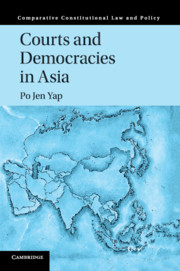Crossref Citations
This Book has been
cited by the following publications. This list is generated based on data provided by Crossref.
Read, Katherine
and
Griffiths, Laura
2018.
Current Awareness.
Legal Information Management,
Vol. 18,
Issue. 1,
p.
65.
Ip, Eric C.
2019.
Hybrid Constitutionalism.
Dressel, Björn
and
Tonsakulrungruang, Khemthong
2019.
Coloured Judgements? The Work of the Thai Constitutional Court, 1998–2016.
Journal of Contemporary Asia,
Vol. 49,
Issue. 1,
p.
1.
ANG, Lance
and
WANG, Jiangyu
2019.
Judicial Independence in Dominant Party States: Singapore's Possibilities for China.
Asian Journal of Comparative Law,
Vol. 14,
Issue. 2,
p.
337.
PASCOE, Daniel
2020.
Judicial and Legal Transformation in Indonesia - Melissa Crouch , The Politics of Court Reform: Judicial Change and Legal Culture in Indonesia (New York and Cambridge: Cambridge University Press, 2019) pp 446. Hardcover: $67.99..
Asian Journal of Law and Society,
Vol. 7,
Issue. 3,
p.
587.
NEO, Jaclyn L.
2020.
A Contextual Approach to Unconstitutional Constitutional Amendments: Judicial Power and the Basic Structure Doctrine in Malaysia.
Asian Journal of Comparative Law,
Vol. 15,
Issue. 1,
p.
69.
YAP, PO JEN
2020.
Democracy, courts and proportionality analysis in Asia.
Global Constitutionalism,
Vol. 9,
Issue. 3,
p.
531.
Yap, Po Jen
and
Lin, Chien-Chih
2021.
Constitutional Convergence in East Asia.
Ip, Eric C.
2021.
European Yearbook of Constitutional Law 2020.
Vol. 2,
Issue. ,
p.
101.
Abeyratne, Rehan
2021.
Global constitutionalism reconfigured through a regional lens.
Global Constitutionalism,
Vol. 10,
Issue. 2,
p.
331.
Dressel, Björn
and
Inoue, Tomoo
2022.
Politics and the Federal Court of Malaysia, 1960–2018: An Empirical Investigation.
Asian Journal of Law and Society,
Vol. 9,
Issue. 1,
p.
26.
Dressel, Björn
and
Bonoan, Cristina Regina
2024.
Courts and authoritarian populism in Asia: Reflections from Indonesia and the Philippines.
Law & Policy,
Vol. 46,
Issue. 3,
p.
277.
Dressel, Bjoern
2024.
Courts and Politics in Southeast Asia.
2024.
The Cambridge Handbook of Comparative Law.
p.
385.
Yap, Po Jen
2024.
The Cambridge Handbook of Comparative Law.
p.
475.



